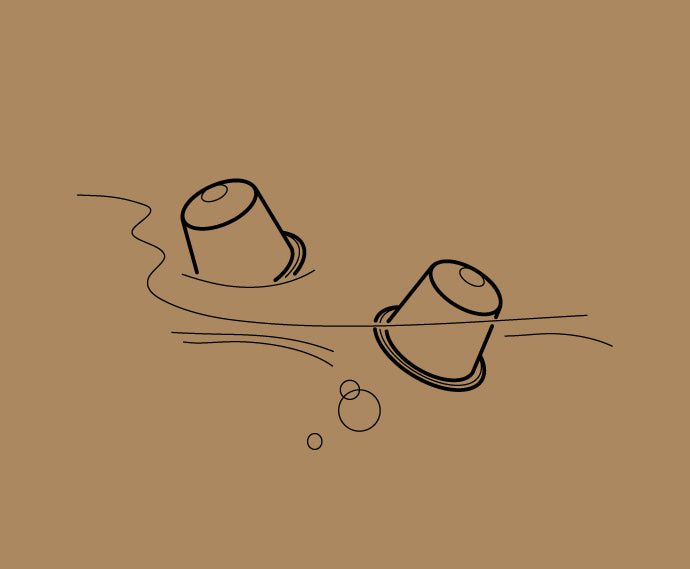ENJOY 20% OFF YOUR FIRST THREE SUBSCRIPTION ORDERS

The effect of plastic coffee pod use on the environment
With 95 million cups of coffee consumed daily in the UK, coffee is one of life’s greatest pleasures for many of us. For the past decade or so, capsule coffees from fancy machines have become part of our daily coffee ritual. Coffee pods were first introduced by Nespresso in 1986 and they have gained increasing levels of popularity through celebrity endorsements from the likes of George Clooney. According to a report by Ross Colbert of Rabobank, coffee pods make up approximately one third of the Western European coffee market.
A Threat to Our Planet
Despite the useful convenience of coffee pods, many capsules are sadly causing a devastating impact on the planet. This article considers how plastic coffee capsules impact the environment, with a specific focus on water pollution.
Landfill crisis
Coffee capsules are great. They are quick, easy and convenient. But many capsules are a guilty pleasure because of the impact they have on our planet. Coffee capsules can take up to 500 years to break down so just imagine the blight these products of convenience can have when they are dumped in landfill.
Composition of Coffee Capsules
The majority of coffee pods are made from plastic or a combination of plastic and aluminium. Many of the former cannot be recycled and the combination of plastic and aluminium in the latter makes recycling these capsules a real challenge. This challenge is further increased when taking into consideration the remaining coffee granules that need to be disposed of separately. This is the reason the majority of plastic and aluminium coffee pods are never recycled and ultimately end up in landfill.
Why Is It So Challenging to Recycle Plastic Coffee Pods?
Whilst some plastic coffee capsules indicate that they can be recycled via the recycling symbol that appears on many boxes of coffee capsules, it is argued that the symbol is a little misleading as it does not convey the difficulty and complexity of recycling coffee pods. Their small size means they are difficult for recycling machinery to process in local recycling plants meaning they are likely to find themselves in landfill, rivers and oceans.
The thickness of the plastic in pods is a huge problem. Recycling these products is highly energy-intensive, consuming incredible amounts of water, electricity and other resources.
Water Pollution
We know that water is essential to life. Sadly, plastic water pollution is one of the worst ecological threats we face in the twenty-first century. Coffee pods are a big player when it comes to the plastic threats to our rivers, lakes and oceans.
The BBC series Blue Planet and environmental charity campaigns have made many of us aware of the devastating impact and damage seen in the ocean ecosystem due to the disposal of plastic. When toxic waste items such as coffee capsules enter water, they might float around and disintegrate and deposit on the bed. All of these degrade the quality of water. With pollutants also seeping through and reaching the groundwater, there is a possibility of contaminated water entering our homes.
Broken down plastics, better known as microplastics, are less than 5 millimetres long. They work their way through our waterways to our oceans, seas and rivers where they are ingested by aquatic life and birds.
Taking a Stand
Organisations are taking a stand. The German city of Hamburg has banned coffee pods from state-run buildings as part of an environmental drive to reduce waste.
The Grocer, a supermarket trade magazine, revealed that 22% of those asked said they owned a coffee machine that used pods. Reassuringly, one in 10 Britons asked said that they believed coffee capsules were very bad for the environment. Awareness is always the first step that leads to positive change.
New Technologies
We have enjoyed the natural world, and most of us want to ensure our descendants can do the same. When it comes to water pollution, some believe that by 2050 there will be more plastic than fish in our seas and coffee pods are a real contributor to this issue.
Fortunately, we are seeing new developments that can transform our coffee-drinking into a far more environmentally-friendly pastime thereby allowing eco-minded coffee drinkers to make the switch to truly sustainable home compostable capsules.
